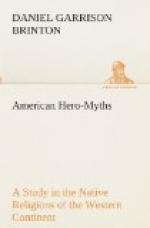[Footnote 1: “Alle Sitten sind sittlich.” Lazarus, Ursprung der Sitte, S. 5, quoted by Roskoff. I hardly need mention that our word morality, from mos, means by etymology, simply what is customary and of current usage. The moral man is he who conforms himself to the opinions of the majority. This is also at the basis of Robert Browning’s definition of a people: “A people is but the attempt of many to rise to the completer life of one” (A Soul’s Tragedy).]
Even the religion which demands bloody sacrifices, which forces its votaries to futile and abhorrent rites, is at least training its adherents in the virtues of obedience and renunciation, in endurance and confidence.
But concerning American religions I need not have recourse to such a questionable vindication. They held in them far nobler elements, as is proved beyond cavil by the words of many of the earliest missionaries themselves. Bigoted and bitter haters of the native faiths, as they were, they discovered in them so much that was good, so much that approximated to the purer doctrines that they themselves came to teach, that they have left on record many an attempt to prove that there must, in some remote and unknown epoch, have come Christian teachers to the New World, St. Thomas, St. Bartholomew, monks from Ireland, or Asiatic disciples, to acquaint the natives with such salutary doctrines. It is precisely in connection with the myths which I have been relating in this volume that these theories were put forth, and I have referred to them in various passages.
The facts are as stated, but the credit of developing these elevated moral conceptions must not be refused to the red race. They are its own property, the legitimate growth of its own religious sense.
The hero-god, the embodiment of the Light of Day, is essentially a moral and beneficent creation. Whether his name be Michabo, Ioskeha, or Quetzalcoatl, Itzamna, Viracocha or Tamu, he is always the giver of laws, the instructor in the arts of social life, the founder of commonwealths, the patron of agriculture. He casts his influence in favor of peace, and against wars and deeds of violence. He punishes those who pursue iniquity, and he favors those who work for the good of the community.
In many instances he sets an example of chaste living, of strict temperance, of complete subjection of the lusts and appetites. I have but to refer to what I have already said of the Maya Kukulcan and the Aztec Quetzalcoatl, to show this. Both are particularly noted as characters free from the taint of indulgence.
Thus it occurred that the early monks often express surprise that these, whom they chose to call savages and heathens, had developed a moral law of undeniable purity. “The matters that Bochica taught,” says the chronicler Piedrahita, “were certainly excellent, inasmuch as these natives hold as right to do just the same that we do.” “The priests of these Muyscas,” he goes on to say, “lived most chastely and with great purity of life, insomuch that even in eating, their food was simple and of small quantity, and they refrained altogether from women and marriage. Did one transgress in this respect, he was dismissed from the priesthood."[1]




